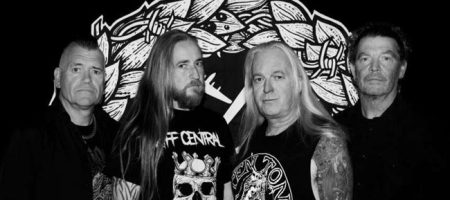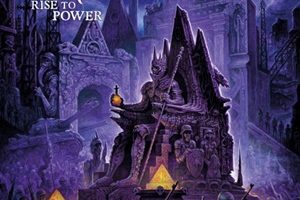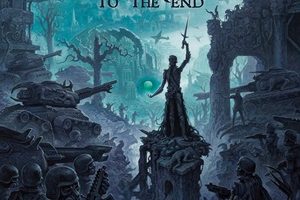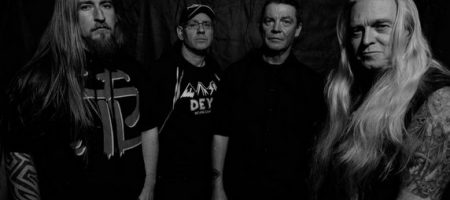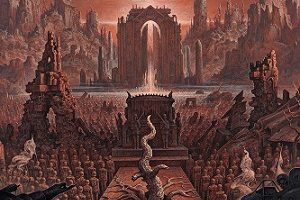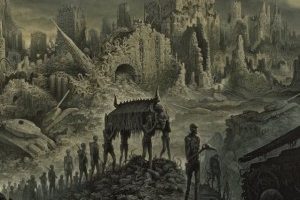Memoriam – The Battle Matches on
Sunday, 11th April 2021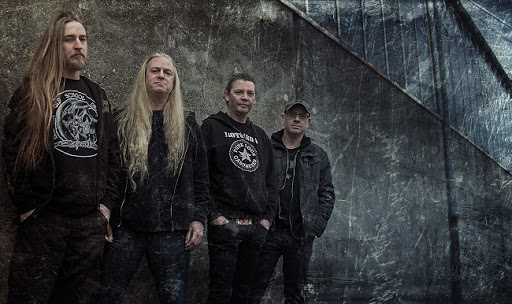
Old school as it gets, UK death metal band Memoriam have now released four albums in five years. Delivering a pummeling brand of riffs, gruff growls, and intertwining a bit of doom and melody into the mix when appropriate, To the End continues the journey set forth with their previous discography – adding little dynamic nuances and earworms to keep listeners happy, surprised, and headbanging away. We spoke to vocalist Karl Willetts recently and he was very gracious to bring us up to date on their recent label switch to Reaper Entertainment, new drummer situation, thoughts on Dan Seagrave as a cover artist, deeper details on the record, and of course some thoughts on the death metal movement and how the world may look coming out of a pandemic.
Dead Rhetoric: To the End is the fourth Memoriam album, and first for new label Reaper Entertainment. What circumstances took place to secure this new label, and where do you see the major differences in this effort compared to your previous discography?
Karl Willetts: Yes, that’s a very good place to start. We are at the cusp of a new adventure with Reaper Entertainment. That came about really as a result of us fulfilling our three-album contract that we had with Nuclear Blast. Which was around about the time that Nuclear Blast got taken over by a multinational conglomerate distributor. As a result of that takeover there was a bit of a shake up on their roster. The amount of records they issue and produce per week is at a phenomenal rate. We had a great time with Nuclear Blast, but with the shakeup we found a lot of the staff we work with directly, they all wanted to leave.
Our main point of contact at Nuclear Blast was Florian Milz, and he left to set up Reaper Entertainment. He approached us and asked us to sign, he put a deal on the table that was better than what we would get with Nuclear Blast. On Nuclear Blast we were a rather small fish in a rather large pond, and we would never be like Amon Amarth or Sabaton, bands that go on tour for eight months of the year to promote their albums with extensive touring schedules. We are not that kind of band, we never will be- that’s not the intention. We do things on our own terms, we do lots of gigs on the weekends, fly in, fly out deals. That’s the way we like to do it. With Reaper we find ourselves in a reverse situation – a larger fish in a rather small pond. That’s great for us, the concentration of effort Florian takes, rather than release three or four albums a week, he does three or four a month. The amount of promotion and publicity, with the box set and vinyl, great products.
We are engaging in a new trilogy of albums with this new start. We have some longevity in this band with the next two or three years, the first one coming out To the End. The major difference between the two is the new trilogy is going to be more uplifting. More focused around hope for the future. The last three albums were born from a very dark place, the catalyst for the starting point is the loss of Martin, that’s been well documented. The themes and topics explored were around grief, mourning, loss, and sorrow. They will always be there, but visually the first three albums were dark. The central theme of all three artworks were a coffin. That format was the death cycle trilogy. Now To the End, it’s the end point of the trilogy. It’s working in reverse, a bit like Star Wars (laughs). The central figure, the character is very much alive. It’s the final marker, the end point of his life. This is about where he leads his epic trip into battle, leading to his death. This is the prequel to that. He’s very much alive in this cover, a bit more light. A glowing orb, symbolizing life and hope. In many respects it correlates to what we are feeling, a bit more upbeat around the world. We’ve had a shared experience on the planet, being cast into a situation that is unprecedented, the covid crisis spreading in the world. There is a feeling of hope in the air, light at the end of the tunnel. We will have some semblance of normalcy, and a celebration of life through death metal. That’s what we are about, celebrating the joy of life.
Dead Rhetoric: What does new drummer Spikey T. Smith bring to Memoriam that may differ from the approach and spirit of Andrew Whale?
Willetts: Losing Andrew from the drum seat was quite traumatic for me. He is one of the reasons I wanted to start a band again, to work with him. He’s one of my best mates. The reality is he developed a rotator cuff issue, a repetitive strain in his shoulder and he couldn’t physically play drums for an extended period of time. It impacted him recording the drums for this album. We wanted to stick to the schedule we had. If we had lost our studio slot – we were the first ones into Parlour Studios as he went through a major refit in the summer. Russ Russell, he is incredibly popular and potentially booked for eighteen months in advance. It would have meant we would have to have gone to a different studio – and we didn’t want to do that, we were very happy with working with Russ. His contribution to what we do is quite understated really, we wanted to maintain that. There’s no timetable for how long it would take Andrew to get better- it may take six months, may take twelve months, may never fully recover. I spoke to him today and he’s doing okay, he’s doing other projects here and there.
We’ve recruited Spike T. Smith. He joined us pretty late in the day, we only had about six weeks before we were due to record the album. We only managed to have a couple of rehearsals with him, we had about three hours total because of the covid restrictions in place. We listened to him play, it jumped out that he has a different way of interpreting the drum patterns. What Whale does is phenomenal, but Spike looks at it a little differently. That’s brought a different flavor, edge to what we do. Making this new album what it is. I’m looking forward to working with him in the future, the next album he’ll have more of a contribution to it. It will be interesting to see what he brings to the ball game with his crazy jazz drumming technique. He’s got a rich resume, bands that are iconic to me – Sacrilege for a start. He’s played for the Damned as well. His experience is second to none – he’s the same age as us, same mindset. His drum patterns add something special to what we have done previously.
Dead Rhetoric: Were there any surprises when it came to the songwriting or performances on this new record?
Willetts: Yeah, Spike more than anything else. One thing that is evident from this album, and different from the previous record, is the fact that we had a lot of spare time on our hands. Normally our time is taken up with rehearsals and shows every other weekend. We’ve got an album that is bubbling up in the background that we are aware of, but we never really focus on that until we are six to eight weeks before we are due to go into the studio. It’s almost a secondary thing. We haven’t had any gigs this year, and we haven’t been able to rehearse due to covid restrictions, so we had plenty of time to work on this new album. The music was pretty much finished by the summer, June/July. Which gave me, rather than two to three weeks to write all the lyrics, I had two to three months. We were very well prepared, so much so I went down to Scott’s studio in September and I demoed the vocals for the album – which is something I never had done before. To test out what was in my mind, what would work or not, and I could change it and work on it.
It gave me a chance to work on the delivery, the structures, the timing. I was entirely happy with that time span, it worked in our favor. We were very prepared and when we went in to record the album in October, the recording process was very smooth. We weren’t 100% sure what Spike was going to put down, and it was a pleasant surprise. He goes in first on his own, we heard it all after and he made something good.
Dead Rhetoric: This is the fourth Dan Seagrave cover as well. Can you discuss your thoughts on his iconic work in the death metal field, and what you enjoy most about his work for Memoriam?
Willetts: When we first got together with Dan, we discussed what we would like to achieve. The aspirations weren’t very high really, maybe do some local shows, release a 7” or an album. Scott wanted an album cover done by Dan Seagrave. Four album covers later, I think he’s definitely ticked that off his bucket list. It is a pleasure to work with Dan. Being involved in that creative process, what you would like to see and what’s in your mind, seeing it develop through rough sketches and rough drafts. He starts inking it, it’s a wonderful process and he always delivers. We finished the first trilogy, and where do we go with this? We had to think about it, to carry on the story, or do we move on and do a stand-alone album? And did we want to continue using Dan? We discussed all these issues, and that’s when we came up with the concept of continuing the story as a prequel, and it was no brainer to use Dan.
Once you set your standards with that kind of level of detail in artwork, if you use a different artist that’s different and maybe not as detailed you are setting yourself up for criticism before a note is even heard. We had to use Dan, we are tied to him for the rest of our career I think. The concept came up in the eleventh hour, it’s the direction we wanted to go with visually. We approached him late, this is our idea, this is what we want, we have eight weeks time, can you deliver? (laughs) Dan is a busy artist, fully booked with bands for the next year or two. We were pushing it a bit, he liked the idea of what we were trying to achieve. We’re really pleased. It’s my favorite cover he’s done for us so far – the detail is always there. There is even a dead dog in a gas mask. The way he visualizes the concept you give to him. We are proud to have him as our in-house artist.
Dead Rhetoric: The productivity of Memoriam is outstanding considering most bands take two to three years between releases. Do you believe this has helped establish the band quicker due to the consistency and quality of your album releases with four full-lengths in five years – especially in age where there are more releases than ever week to week in all kinds of metal subgenres?
Willetts: Yes, absolutely there is a wealth of releases. This is what we intended to do when we first started out. We were very aware of our age, and we want to achieve as much as we can in this relatively short space of time we’ve got left on this mortal coil. We don’t try to dwell much on the past, once we’ve done something and it’s out, we like to move forward and move on to the next (album). We have released albums at a voracious pace, and it suits us. We have a certain kind of old school death metal groove, we aren’t going to play at this frenetic pace, outside of our ability I think. We are quite happy with the space we’ve got, we experiment and try some different things as we have with this album. I think the key word is diverse, lots of tones, sounds, and textures that we’ve never really tried before and that comes with confidence and what we’ve achieved previously.
Four albums in five years, I think we may start to slow down a bit, maybe one every eighteen months or so. Having covid and having more space and time to prepare, I think we are going to use that in the future, it works really well for us. It’s how it used to be back in the day, bands used to release an album every other year. And that’s what we are trying to recapture, that essence of the old school feel. We are already working on songs for the next album, already. The pace still continues. I can’t imagine us doing this until we are seventy, but who knows – maybe we will be the Rolling Stones of death metal (laughs).
Dead Rhetoric: How much of a charge do you get performing death metal now in your fifties – and does it differ from your time in Bolt Thrower over the years? Do you believe you have gained a different perspective and appreciation now compared to then?
Willetts: Yeah, I think I have. We are very appreciative to still be doing this. If you asked me thirty years ago when I was in my early twenties, when I first started doing this, if I would be doing this when I am 54, which I am this year – I’d have laughed at you. I did leave the whole thing at one point in time, but I always missed it in the back of my mind, performing on stage and recording. Now, I think at this point in our lives, I probably enjoy it a lot more than back in the day. I can take it for what it is, we are in a privileged position to do this. The whole chemistry we have in the band works really well. It’s not just the music we create but the social element of what we do- going to the rehearsal room, having a few beers, busting out some songs and doing something great. We couldn’t do anything else, we refuse to retire because what else would we do? We do it on our own terms. The fact that other people quite like it too, it’s an added bonus at the end of the day.
Dead Rhetoric: You have a degree in cultural studies from Birmingham University. Has that educational foundation had an impact on the lyrical content at certain times in Memoriam – and how thankful are you for going through that experience, taking a break from the metal scene?
Willetts: Going to university was quite a big thing for me. I left school, I wasn’t very focused on it. I was aware, in a way, that the educational system had kind of failed me in a way. When I first started out in bands in the 80’s, I did it in my spare time my qualifications to the university. In subjects that I was engaged in, such as English literature, psychology, sociology. I got all my advanced level qualifications, and I went to university in 1992 and it was around that point that Bolt Thrower started to get quite busy, tours for six to eight weeks. It was a sociology degree into a social worker degree. That was always in the back of mind, to go back. When I left Bolt Thrower in 1994, I went to Birmingham University in 1995 and did a three-year degree in cultural studies. It was a mind opening course load about contemporary social theories, physical and social, sexuality, gender, African and Russian cultural studies. In a way, this formulates a concept of what my lyrical content was all about previously. I used to write from this perspective, but on what terms it was. It really helps me to conceptualize and put some intellectual content into what we are doing.
I left there with a massive amount of debt and a nice paper with this degree, a lot of great friends. It has opened some doors, you have a level of intellect and it shows you can put in the effort to learn, the theory side of things. I would never decry anyone to go to university.
Dead Rhetoric: The band remains selective on the touring front – obviously preferring quality over quantity due to your families and careers at this point in your lives. What are your thoughts on the larger festival market that overtakes Europe from early summer to early fall, and how that differs from regular club/theater gigs for Memoriam?
Willetts: Almost beyond that, it goes throughout the whole year. They are a different animal, aren’t they? I always prefer the smaller, club shows – 300-500 people. The people are there to see you alone, it’s not just a conveyor belt of different bands. It’s almost a faceless entity when you play these (festivals), sometimes you feel like you are getting in the way a bit. It’s great to play these shows, don’t get me wrong- it’s an experience to play to 20,000 people at once. We don’t do everything though, we are selective in what we do because our time is precious, really. We have responsibilities outside of the band, we have a discussion about what we want to do. We try to find a nice balance between our personal lives, our social lives, and the band activities.
I’m looking forward to going back and doing any kind of show, to be honest. I’ll play on the street corner, almost. That’s what it’s all about, that live performance, we really miss that. We had a busy, hectic schedule lined up for 2020 and it kicked off well, we did shows in London and then Denmark before all of a sudden it all stopped. We aren’t the only ones out there dying to get out there to do shows. Once it all opens up, there’s going to be a glut of shows. It could have a detrimental effect, bands will be playing every night especially in larger cities. There is only so much you can go and see and spend your money on.
Dead Rhetoric: Do you think this break from live shows allows people to appreciate the music and physical medium of listening to metal more?
Willetts: We are all going to appreciate things a lot more. Engage a lot more in the things we love to do. It’s been such a long time to have the opportunity to go to gigs. One thing I’ve noticed, our social media support has been quite good, to connect with one another is still there. We’ve seen a steady group of people buying our merchandise online, because they can’t get out to gigs. We need their support financially, so buying our merchandise has been really nice to see that, it makes you feel wanted. Once this all clears, people will have a bit more appreciation for the things that they’ve missed.
Dead Rhetoric: We lost a pioneer for the Swedish death scene in Entombed vocalist LG Petrov recently. Do you have any special memories or times surrounding this man to share?
Willetts: Yeah, absolutely. A loss for words about it really. Another one of those experiences where you kind of know someone who passes on. It happens on a much more regular basis as we get older. When you hear about this it kind of makes you realize about your own mortality, our time is limited and you embrace every moment and take it and enjoy it. One thing you can never take away from LG, he lived his life to the fullest. What a character, every time I met him he was just full of life. He was a lovely man, great to be around. Last time we played with Entombed A.D. was in Helsinki about eighteen months ago, a fantastic experience backstage drinking cocktails out of a fruit bowl, which is always the way with LG. It was sad, when I found out about it we knew he was ill. I recorded something for his birthday, because it was his birthday a few weeks ago as well. I recorded a birthday greeting for him. We had some good times. Those memories you leave behind with the people. That will never die and I will hold those memories to my heart.
Dead Rhetoric: What are some of your fondest or proudest memories surrounding your musical career – specific albums, shows, festivals, or other memories where you knew you were making an impact with your work?
Willetts: There are specific points in life, light bulb moments that are a bit special. Specifically around the first time I was featured on a John Peel session, being played on the John Peel radio show in the late 80’s, that was an amazing experience. That was the start of it all. For me it’s always the firsts – when you do something for the first time, that’s always the most special. The first album, the first time we played in London, the first time we played shows in Europe with Autopsy, great memories. The first time we got to America in a greyhound bus that ended up breaking down. Going to Australia was a huge buzz – I remember standing on the beach in Perth and watching the ocean waves rolling in. It’s quite an honor for people from Birmingham to be on the other side of the world, doing gigs and getting paid to do this. And that’s great, for me I feel like I am sort of doing this again with Memoriam. I don’t think you get the chance often to do it twice or three times in life as I have. I appreciate every moment I am able to do this.
Dead Rhetoric: How do you view the state of death metal today? Does it surprise you that not only there is consistent product being released by the pioneers of the movement, but a new generation globally putting forth records and pushing the spirit of the movement to younger audiences?
Willetts: It’s phenomenal that in this point that there are lots of bands still doing this from back in the 80’s and 90’s, that are still going. Old school bands that refuse to do anything else. It’s great and healthy. That’s only really because of the strength of the scene. It’s not just us, our music has inspired a younger generation that’s coming up, and not specifically to copy it, but come up with their own interpretation of that and put their own stamp on it. So they can form their own sense of identity and belonging to a scene. That’s what has kept the old school death scene alive and still gives us the opportunity to still be doing this. There are all these new sub-genres, technical death metal, and that’s what has kept the extreme metal scene alive throughout the decades. We are very thankful for that. Every so often I hear a new band and there’s some great stuff. You never think you are going to be an inspiration for younger bands when we are creating this music twenty and thirty years ago. I’m very proud of that heritage, and glad the likes of us, Autopsy, Napalm Death, Carcass, Benediction, Asphyx, the list is endless – we are all still doing this. Without an audience who appreciates that and outlets like yourselves to promote this, we wouldn’t be around.
Dead Rhetoric: What concerns do you have about the world that we live in today? How do you believe humanity will react coming out of this global pandemic?
Willetts: That’s very heavy! (laughs). Oh gosh yes, the concerns I have with the world we live in. Endless.. it’s well documented where I stand on anti-fascist beliefs. My major concern is the rise of global nationalism, a plague that seems to be infecting every single country in the world. It’s a global way, which in my opinion is worse because it’s a disease that is spreading, fueled by the right-wing media. And right-wing politics. These issues are all prevalent in my mind. These ideals are festering in the background, and we’ve all been fairly isolated for the past twelve months, waiting in our own social network bubbles, our own echo chambers. We tend to engage with people with similar mindsets, our own bubble of people that agree with what we are saying. This in a way is forcing the divisions even more so. Dividing the world in a way, the dichotomy and the arguments, you end up with equal ground between one thing or the other. It’s going to be interesting once we get back to normal where these politics are going to be standing, the status of the world. To see the storming of the Capitol building in the United States is alarming. Who knows where we are going to be?
I think we are going to be a lot more tolerant, but different. I think the world from one perspective would be different but boring, a dull place if we all thought the same. I would like to see a world, post-covid, where we all embrace more diversity, a lot more welcoming of other people. I’m hopeful for the future, and the world provides me with a lot of inspirational things to talk about in my lyrics.
Dead Rhetoric: What’s on the horizon for Memoriam over the next year or so? Will there be any special projects or other outside band activities from the members in the pipeline to look forward to?
Willetts: We are doing that a little bit. We still can’t rehearse together or do shows, probably until June, July or August this year. We have time to do other things. I have been doing some guest vocal things for some other bands. I’m working on a little project with Scott as well, which is kind of electronic-driven synth, epic film scenario music. That’s something exciting. There are side projects to keep us busy, but our main thing will always be Memoriam. We have other things in the pipeline for that, we are writing for the next album. It’s all good and keeping us focused and busy.











